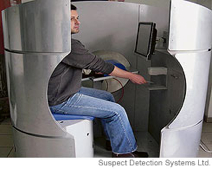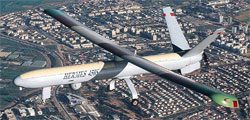
 Innovative Minds © 2014. All Rights Reserved. www.inminds.co.uk | ||||
Gaza: Not Just a Prison, a LaboratoryNaomi Klein, The Nation, July 2, 2007 issue
Since Israel began its policy of sealing off the occupied territories with checkpoints and walls, human rights activists have often compared Gaza and the West Bank to open-air prisons. But in researching the explosion of Israel’s homeland security sector it strikes me that they are something else too: laboratories where the terrifying tools of our security states are being field-tested. Palestinians are no longer just targets. They are guinea pigs.
Gaza in the hands of Hamas, with masked militants sitting in the president’s chair; the West Bank on the edge; Israeli army camps hastily assembled in the Golan Heights; a spy satellite over Iran and Syria; war with Hezbollah a hair trigger away; a scandal-plagued political class facing a total loss of public faith. At a glance, things aren’t going well for Israel. But here’s a puzzle: why, in the midst of such chaos and carnage, is the Israeli economy booming like it’s 1999, with a roaring stock market and growth rates nearing China’s? Thomas Friedman recently offered his theory in the New York Times. Israel “nurtures and rewards individual imagination,” and so its people are constantly spawning ingenious high-tech start-ups - no matter what messes their politicians are making. After perusing class projects by students in engineering and computer science at Ben Gurion University, Friedman made one of his famous fake-sense pronouncements: Israel “had discovered oil.” This oil, apparently, is located in the minds of Israel’s “young innovators and venture capitalists,” who are too busy making megadeals with Google to be held back by politics. Here’s another theory: Israel’s economy isn’t booming despite the political chaos that devours the headlines, but because of it. This phase of development dates back to the mid-nineties, when Israel was in the vanguard of the information revolution - the most tech-dependent economy in the world. After the dot-com bubble burst in 2000, Israel’s economy was devastated, facing its worst year since 1953. Then came 9/11, and suddenly new profit vistas opened up for any company that claimed it could spot terrorists in crowds, seal borders from attack and extract confessions from closed-mouthed prisoners.  Suspect Detection Systems Cogito1002 biofeedback terminal has been used at a West Bank checkpoint
Like hundreds of other Israeli security start-ups, SDS boasts that it was founded by veterans of Israel’s secret police and that its products were road-tested on Palestinians.
Within three years, large parts of Israel’s tech economy had been radically repurposed. Put in Friedmanesque terms: Israel went from inventing the networking tools of the “flat world” to selling fences to an apartheid planet. Many of the country’s most successful entrepreneurs are using Israel’s status as a fortressed state, surrounded by furious enemies, as a kind of twenty-four-hour-a-day showroom-a living example of how to enjoy relative safety amid constant war. And the reason Israel is now enjoying supergrowth is that those companies are busily exporting that model to the world. Discussions of Israel’s military trade usually focus on the flow of weapons into the country-US-made Caterpillar bulldozers used to destroy homes in the West Bank and British companies supplying parts for F-16s. Overlooked is Israel’s huge and expanding export business. Israel now sends $1.2 billion in “defense” products to the United States-up dramatically from $270 million in 1999. In 2006 Israel exported $3.4 billion in defense products-well over a billion more than it received in US military aid. That makes Israel the fourth-largest arms dealer in the world, overtaking Britain. Much of this growth has been in the so-called “homeland security” sector. Before 9/11 homeland security barely existed as an industry. By the end of this year, Israeli exports in the sector will reach $1.2 billion-an increase of 20 percent. The key products and services are high-tech fences, unmanned drones, biometric IDs, video and audio surveillance gear, air passenger profiling and prisoner interrogation systems - precisely the tools and technologies Israel has used to lock-in the occupied territories.
By the end of this year, Israeli exports in homeland security will reach $1.2 billion. The key products and services are high-tech fences, unmanned drones, biometric IDs, video and audio surveillance gear, air passenger profiling and prisoner interrogation systems - precisely the tools and technologies Israel has used to lock-in the occupied territories.
And that is why the chaos in Gaza and the rest of the region doesn’t threaten the bottom line in Tel Aviv, and may actually boost it. Israel has learned to turn endless war into a brand asset, pitching its uprooting, occupation and containment of the Palestinian people as a half-century head start in the “global war on terror.” It’s no coincidence that the class projects at Ben Gurion that so impressed Friedman have names like “Innovative Covariance Matrix for Point Target Detection in Hyperspectral Images” and “Algorithms for Obstacle Detection and Avoidance.” Thirty homeland security companies were launched in Israel in the past six months alone, thanks in large part to lavish government subsidies that have transformed the Israeli army and the country’s universities into incubators for security and weapons start-ups (something to keep in mind in the debates about the academic boycott). Next week, the most established of these companies will travel to Europe for the Paris Air Show, the arms industry’s equivalent of Fashion Week. One of the Israeli companies exhibiting is Suspect Detection Systems (SDS), which will be showcasing its Cogito1002, a white, sci-fi-looking security kiosk that asks air travelers to answer a series of computer-generated questions, tailored to their country of origin, while they hold their hand on a “biofeedback” sensor. The device reads the body’s reactions to the questions and certain responses flag the passenger as “suspect.”  Hermes 450 UAV, armed versions have been used in Gaza
Another star of the Paris Air Show will be Israeli defense giant Elbit, which plans to showcase its Hermes 450 and 900 unmanned air vehicles. As recently as May, according to press reports, Israel used the drones on bombing missions in Gaza.
Like hundreds of other Israeli security start-ups, SDS boasts that it was founded by veterans of Israel’s secret police and that its products were road-tested on Palestinians. Not only has the company tried out the biofeedback terminals at a West Bank checkpoint, it claims the “concept is supported and enhanced by knowledge acquired and assimilated from the analysis of thousands of case studies related to suicide bombers in Israel.” Another star of the Paris Air Show will be Israeli defense giant Elbit, which plans to showcase its Hermes 450 and 900 unmanned air vehicles. As recently as May, according to press reports, Israel used the drones on bombing missions in Gaza. Once tested in the territories, they are exported abroad: the Hermes has already been used at the Arizona-Mexico border; Cogito1002 terminals are being auditioned at an unnamed US airport; and Elbit, one of the companies behind Israel’s “security barrier,” has partnered with Boeing to construct the Department of Homeland Security’s $2.5 billion “virtual” border fence around the United States.
Thirty homeland security companies were launched in Israel in the past six months alone, thanks in large part to lavish government subsidies that have transformed the Israeli army and the country’s universities into incubators for security and weapons start-ups (something to keep in mind in the debates about the academic boycott).
Since Israel began its policy of sealing off the occupied territories with checkpoints and walls, human rights activists have often compared Gaza and the West Bank to open-air prisons. But in researching the explosion of Israel’s homeland security sector, a topic I explore in greater detail in a forthcoming book (The Shock Doctrine: The Rise of Disaster Capitalism), it strikes me that they are something else too: laboratories where the terrifying tools of our security states are being field-tested. Palestinians - whether living in the West Bank or what the Israeli politicians are already calling “Hamasistan” — are no longer just targets. They are guinea pigs. So in a way Friedman is right: Israel has struck oil. But the oil isn’t the imagination of its techie entrepreneurs. The oil is the war on terror, the state of constant fear that creates a bottomless global demand for devices that watch, listen, contain and target “suspects.” And fear, it turns out, is the ultimate renewable resource. Source: http://www.thenation.com/docprint.mhtml?i=20070702&s=klein Also Of InterestPage URL: http://www.inminds.co.uk/article.php?id=10143
|
|
Support Us
If you agree with our work then please support us.Campaigns INMINDS Facebook Live Feed Latest Video's
INMINDS Twitter Feed Tweets by @InmindsComFeatured Video's
You need Flash player 8+ and JavaScript enabled to view this video.
[all videos (over 200)..] Featured MP3 Podcast  "Scalp bounties were the payment of a fee for proof of death of an Indian, any Indian, on a graduated scale. At the top of the scale they would pay the highest amount for proof of death by way of the production of a scalp, or bloody red skin - origin of the term 'red skins' - of an adult male Indian. Half that fee would be payed for proof of death by the same means of a adult female, quarter to be payed for proof of death of a child, child being defined as as a human being under 10 years of age down to and including a fetus.. every single colony on the east coast, every state of the Union and territory of the United States within the confines of the 48 contiguous states, had in place, in some period of its history, a scalp bounty - removed usually when there were no longer sufficient number of Indians left to kill to warrant its continuation..that's as absolutely clinical a genocidal policy as is possible to envision, they weren't interested in any particular Indians, any Indians would do and they would pay for proof of death - they wanted all of us dead." American Indian scholar, activist in the struggle for liberation of Indigenous Peoples in America Genocide of Indigenous Peoples in North America, Action for Social and Ecological Justice on December 2, 2001, in Burlingotn, VT [50min / 11Mb] [all podcasts..] Newsletter Feedback |
 |
 |















































